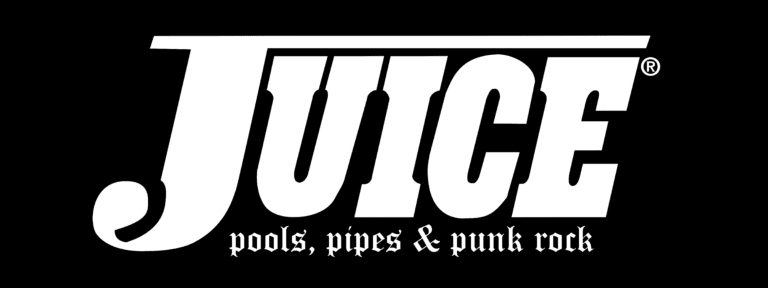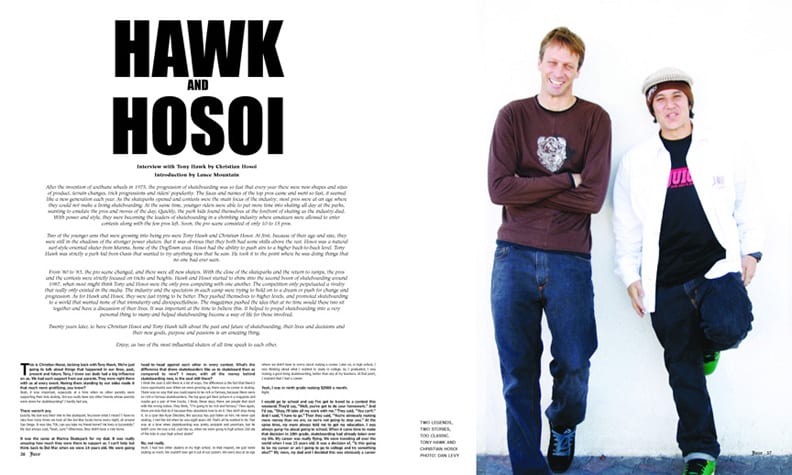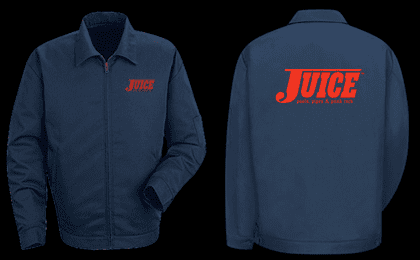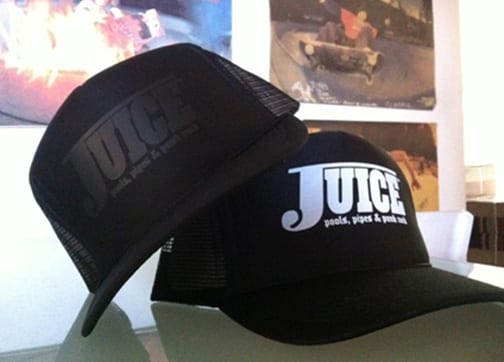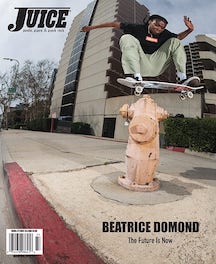INTERVIEW BY CHRISTIAN HOSOI
INTRODUCTION BY LANCE MOUNTAIN
PHOTOGRAPHY BY DAN LEVY
After the invention of urethane wheels in 1975, the progression of skateboarding was so fast that every year there were new shapes and sizes of product, terrain changes, trick progressions and riders’ popularity. The faces and names of the top pros came and went so fast, it seemed like a new generation each year. As the skateparks opened and contests were the main focus of the industry, most pros were at an age where they could not make a living skateboarding. At the same time, younger riders were able to put more time into skating all day at the parks, wanting to emulate the pros and moves of the day, Quickly, the park kids found themselves at the forefront of skating as the industry died. With power and style, they were becoming the leaders of skateboarding in a shrinking industry where amateurs were allowed to enter contests along with the few pros left. Soon, the pro scene consisted of only 10 to 15 pros.
“WHEN I WAS GROWING UP, YOU EITHER SKATED VERT OR YOU SKATED FREESTYLE. THE FREESTYLERS WERE DORKS. YOU WERE EITHER COOL SLASHING POOLS OR YOU WERE DANCING AROUND ON YOUR LITTLE ORANGE BOARD DOING WHEELIES. ARE YOU KIDDING ME? I CHOSE VERT.”
Two of the younger ams that were growing into being pro were Tony Hawk and Christian Hosoi. At first, because of their age and size, they were still in the shadows of the stronger power skaters. But it was obvious that they both had some skills above the rest. Hosoi was a natural surf-style-oriented skater from Marina, home of the DogTown area. Hosoi had the ability to push airs to a higher back-to-back level. Tony Hawk was strictly a park kid from Oasis that wanted to try anything new that he saw. He took it to the point where he was doing things that no one had ever seen.
From ’80 to ’83, the pro scene changed, and there were all new skaters. With the close of the skateparks and the return to ramps, the pros and the contests were strictly focused on tricks and heights. Hawk and Hosoi started to shine into the second boom of skateboarding around 1987, when most might think Tony and Hosoi were the only pros competing with one another. The competition only perpetuated a rivalry that really only existed in the media. The industry and the spectators in each camp were trying to hold on to a dream or push for change and progression. As for Hawk and Hosoi, they were just trying to be better. They pushed themselves to higher levels, and promoted skateboarding to a world that wanted none of that immaturity and disrespectfulness. The magazines pushed the idea that at no time would these two sit together and have a discussion of their lives. It was important at the time to believe this. It helped to propel skateboarding into a very personal thing to many and helped skateboarding become a way of life for those involved.
Twenty years later, to have Christian Hosoi and Tony Hawk talk about the past and future of skateboarding, their lives and decisions and their new goals, purpose and passions is an amazing thing. Enjoy, as two of the most influential skaters of all time speak to each other.
This is Christian Hosoi, kicking back with Tony Hawk. We’re just going to talk about things that happened in our lives, past, present and future. Tony, I know our dads had a big influence on us. We had such support from our parents. They were right there with us at every event. Having them standing by our sides made it that much more gratifying, you know?
Yeah, it was important, especially at a time when no other parents were supporting their kids skating. Did you really have any other friends whose parents were down for skateboarding? I hardly had any.
There weren’t any.
Exactly. My dad was their ride to the skatepark. You know what I mean? I have no idea how many times we took all the Del Mar locals home every night, all around San Diego. It was like, ‘Oh, can you take my friend home? He lives in Escondido.’ My dad always said, ‘Yeah, sure.’ Otherwise, they didn’t have a ride home.
It was the same at Marina Skatepark for my dad. It was really amazing how much they were there to support us. I can’t help but think back to Del Mar when we were 14 years old. We were going head-to-head against each other in every contest. What’s the difference that drove skateboarders like us to skateboard then as compared to now? I mean, with all the money behind skateboarding now, is the soul still there?
I think the soul is still there in a lot of ways. The difference is the fact that there’s more opportunity now. When we were growing up, there was no career in skating. There was no way that you could aspire to be rich or famous, because there were no rich or famous skateboarders. The top guys got their picture in a magazine and maybe got a pair of free trucks. I think, these days, there are people that start with the wrong notion. They think, ‘I’m going to be rich and famous.’ Then again, there are kids that do it because they absolutely love to do it. They don’t stop doing it. In a case like Ryan Sheckler, the success has just fallen on him. He never quit skating. I met the kid when he was eight years old. That’s all he wanted to do. That was at a time when skateboarding was pretty unstable and uncertain, but he didn’t care. He was a kid. Just like us, when we were going to high school. Did any of the kids in your high school skate?
No, not really.
Yeah. I had two other skaters in my high school. In that respect, we just loved skating so much. We couldn’t ever get it out of our system. We were also at an age where we didn’t have to worry about making a career. Later on, in high school, I was thinking about what I wanted to study in college. As I graduated, I was making a good living skateboarding, better than any of my teachers. At that point, I realized that I had a career.
Yeah, I was in ninth grade making $2,000 a month.
Right.
I would go to school and say I’ve got to travel to a contest this weekend. They’d say, ‘Well, you’ve got to do your homework.’ And I’d say, ‘Okay, I’ll take all my work with me.’ They said, ‘You can’t.’ And I said, ‘I have to go.’ Then they said, ‘You’re obviously making more money than we are, so we’re not going to stop you.’ At the same time, my mom always told me to get my education. I was always gung-ho about going to school. When it came time to make that decision in 10th grade, skateboarding had already taken over my life. My career was really flying. We were traveling all over the world when I was 15 years old. It was a decision of, ‘Is this going to be my career or am I going to go to college and try something else?’ My mom, my dad and I decided this was obviously a career for me. They said, ‘Do it, and we’ll try and get your schooling in later.’ I finally dropped out of high school. I couldn’t even finish because I was traveling so much.
Right. It was hard to get the blessing then, because it was skateboarding. If it were something else that was more accepted, it would have been different. If we were tennis prodigies, there would have been no question. They would have said, ‘Here’s your homework. Go for it. It’s all you. You have a future.’ Because we were skateboarding, it was perceived as outlawish or dangerous with no future.
We were definitely rebellious in the eyes of society at the time. I think that kept the thrill of it alive, with the backyard pools and skating down the streets and hills.
Yeah, that’s exactly why I started. I wasn’t down with all the team sports. I just wasn’t feeling the conformity. I loved that I could go skate in my own style and on my own schedule. That’s what drove me. The skatepark was my salvation. Those guys from the skatepark were the guys that I hung out with, even though they were older and came from completely different backgrounds. That skatepark was our common ground. It was our hangout. The collection of people at the skateparks then was just the oddballs, the freaks and the outcasts.
I look back at the situations we were in and the fun we had. There obviously wasn’t very much money in it for us. We were making $250 for first place at a contest…
[laughs] Yeah, first was $250, maybe.
Yet we were skating our hearts out. We didn’t care about that. The money was not the object. We just loved what we did. I do see it in some skaters today, but I see it’s difficult for them to hold on to that sincere love for what they do. They are bombarded by so much promotion. It becomes a job. It becomes just a drag to do. You and I just powered through it. We had no choice. We loved what we did. We powered through an era when skateboarding went through some ups and downs, especially when street skating came in. The magazines and companies were saying vert was dead, because they were making money off the street skating. But that didn’t deter our love for skating vert and pools.
Yeah.
Obviously, today, with all the skateparks popping up everywhere, vert is not dead. They’re finally recognizing it. The true soul of the sport is in vert and in pools, where the history of skating began.
One of my favorite questions from kids is, ‘Why did you choose vert?’ I say, ‘Are you kidding me?’ When I was growing up, you either skated vert or you skated freestyle. The freestylers were dorks. You were either cool, slashing pools or you were dancing around on your little orange board doing wheelies. Are you kidding me? I chose vert.
We all thought freestyle was the rollerblading or the boogie boarding of skateboarding. When Rodney Mullen started doing his ollie late grabs and kickflips, we were kind of in awe. He was way before his time.
Yeah, but he still didn’t make me want to be a freestyler. I just wanted to figure out how to take what he was doing to vert and the pools. I saw what he did and thought, ‘Yeah, maybe I could flip my board when I’m up in the air.’ That’s why I did finger flips, because I saw Rodney Mullen.
FOR THE REST OF THE STORY, ORDER ISSUE #58 BY CLICKING HERE…
SHARE THIS POST:
- Click to email a link to a friend (Opens in new window)
- Click to share on Tumblr (Opens in new window)
- Click to share on LinkedIn (Opens in new window)
- Click to share on Pinterest (Opens in new window)
- Click to share on Twitter (Opens in new window)
- Click to share on Facebook (Opens in new window)
- Click to share on Reddit (Opens in new window)
- Click to print (Opens in new window)
